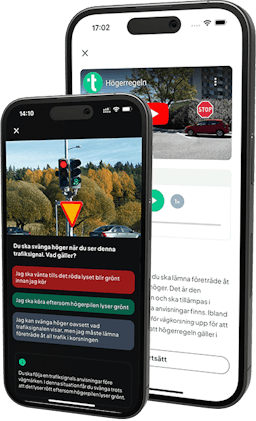Superficial Learning and Deep Learning
It is important that you always strive towards deep learning. This means that the information you learn sticks in your memory and is not easily forgotten. You will not only remember what various rules and signs are called, but you will also understand why they exist and how you should use them. This will enable you to get more use out of the theory in practice and enable you to remember what you have learned for longer.
Superficial learning means that you only memorise information ahead of your theory test and that you do not acquire a deeper understanding of what you learn. With superficial learning, you will quickly forget the knowledge you have acquired.
Overlearning
Overlearning is an important part of your training. It is about practising so much that you become able to undertake the technical aspects of driving automatically. If you can manoeuvre the car without thinking about it, then you will be free to focus instead on planning how you drive and detecting hazards. Overlearning helps you to retain your skills, even if you stop driving for a longer period of time.

Learning by Imitation
Learning by imitation means that you watch what other people do and mimic their behaviour. Inexperienced drivers in particular tend to copy the behaviour of other drivers as the assumption is that experienced drivers are more capable.
Learning by imitation can be beneficial, but there is a risk that you will pick up other people’s bad habits. If other drivers take unnecessary risks or break traffic regulations, for example, then there is a risk that you will do the same.
To avoid this, you should ask yourself:
- Is it legal to drive that way?
- Am I experienced enough to drive in the same way?
Learning from Probability
Learning from probability is when you learn from previous occurrences and experience. You draw conclusions about probabilities and risks based on what you have experienced and you act accordingly. There are both positives and negatives when it comes to learning from probability:
Example of positive learning from probability
You drive past a school every morning on your way to work. You know from experience that there is a greater risk of children on the road here and so you drive more slowly and carefully.

Example of negative learning from probability
You regularly drive across an uncontrolled level crossing where you know from experience that trains rarely pass through. Despite poor visibility, you drive too quickly when you pass the crossing. This is very dangerous, as there is still a risk, that a train can pass by.


